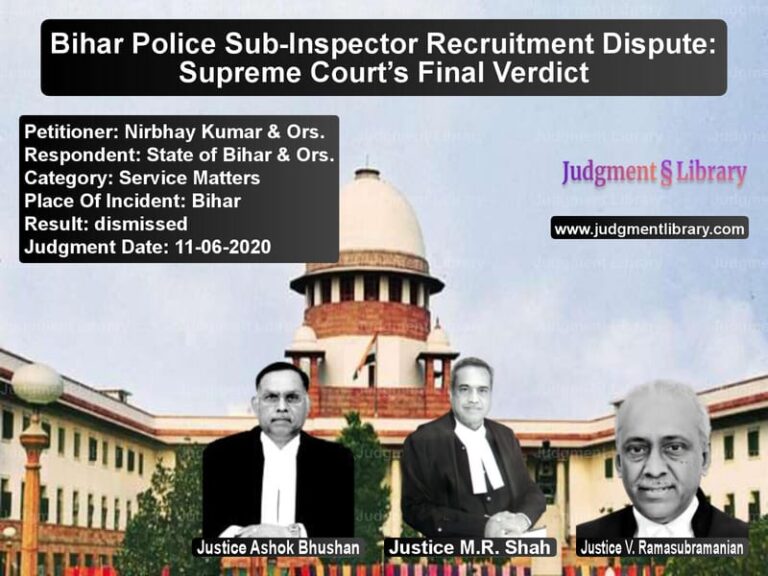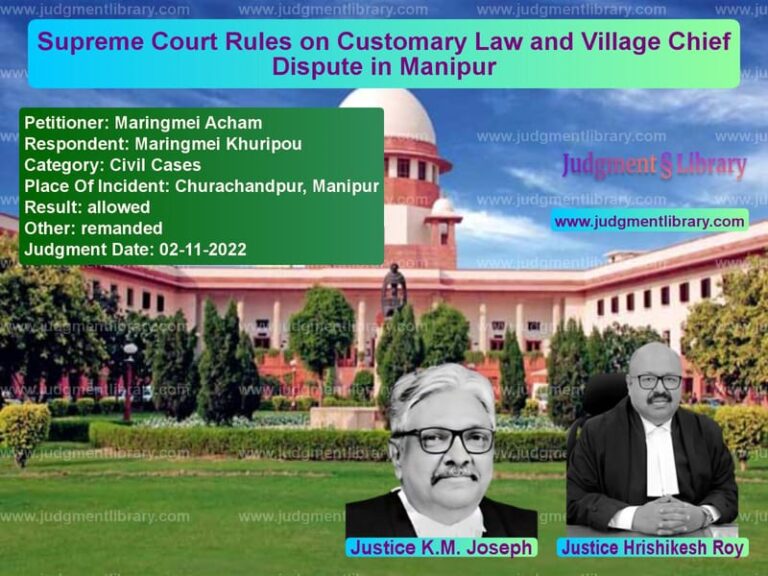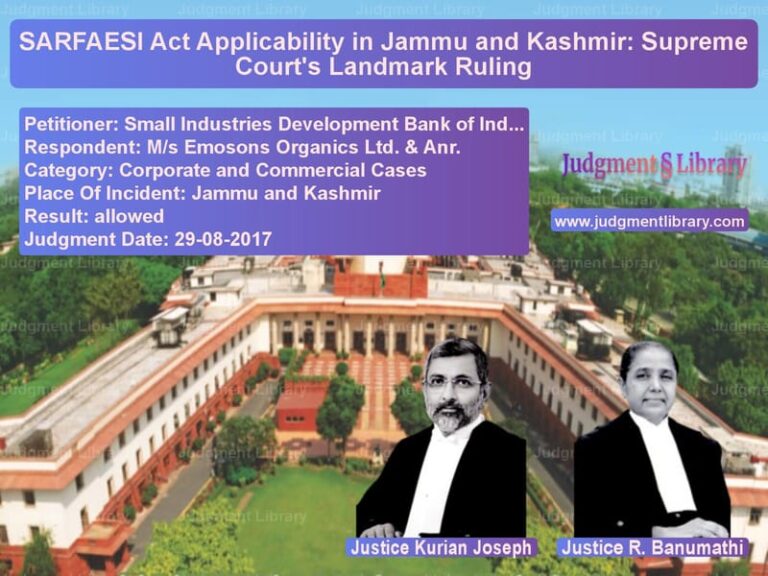Jharkhand Mining Lease Dispute: Supreme Court Upholds State’s Decision to Annul Auction
The case of State of Jharkhand v. Sociedade De Fomento Industrial Pvt. Ltd. revolves around the allocation of a mining lease through an e-auction process. The Supreme Court of India was tasked with deciding whether the annulment of the auction process by the State of Jharkhand was legally justified or if the respondent’s bid should have been considered further.
Background of the Case
The dispute arose when the State of Jharkhand issued a notice inviting tender (NIT) on October 25, 2019, for granting a mining lease over an area of 75.193 hectares in Lodhapat, Jobhipat, and Hethilodha blocks. The tender was conducted through the digital platform MSTC, and the last date for submission of technical bids was December 16, 2019.
However, Sociedade De Fomento Industrial Pvt. Ltd. (Respondent) did not submit its bid online but instead submitted a physical copy of the bid, which was acknowledged via email on December 16, 2019. This led to complications when the Tender Evaluation Committee (TEC) reviewed the submitted documents on December 17, 2019.
Legal Proceedings and Arguments
The matter went through multiple levels of legal scrutiny:
- The TEC determined that since the respondent had failed to submit its bid electronically, the technical bid was deemed not received, and the auction was annulled.
- A second attempt at the auction was initiated on January 28, 2020, where only the respondent submitted a bid.
- The TEC recommended considering the respondent’s bid further, but the State decided to annul the auction again and go for a fresh tender.
- The respondent filed a writ petition challenging the annulment of the second auction, which was dismissed by the Single Judge of the High Court.
- The Division Bench of the High Court overturned the decision, ruling that the State was bound to continue with the auction process under Rule 9(12) of the Mineral (Auction) Rules, 2015.
The Supreme Court had to determine whether the decision of the State of Jharkhand to annul the auction was lawful and whether the High Court’s ruling was justified.
Supreme Court’s Observations
The Supreme Court analyzed the applicable legal framework, including the Mines and Mineral (Development and Regulation) Act, 1957 and the Mineral (Auction) Rules, 2015. The key considerations were:
- The initial auction attempt did not receive any valid bids as per the tender requirements.
- The second auction attempt only received a single bid, which did not satisfy competitive bidding norms.
- Under Rule 9(12) of the Mineral (Auction) Rules, 2015, if there are fewer than three qualified bidders in an auction attempt, the State has the discretion to annul the auction and conduct a fresh tender.
- The State has a duty to ensure competitive bidding to maximize revenue from natural resources.
The Court noted:
“The State Government is assumed to know the commercial value of the natural resources tendered/auctioned, along with the commercial propensity to earn in a future point of time. Therefore, the statutory rules envisage the method of the bid cum e-auction process by shortlisting not only the technically qualified bidders but also particular bids satisfying the eligibility criteria even for allowing their participation in e-auction.”
Final Judgment and Rationale
The Supreme Court ruled in favor of the State of Jharkhand, setting aside the High Court’s decision. The Court emphasized that:
- The annulment of the auction was within the State’s authority under Rule 9(12).
- Awarding a mining lease based on a single bid could be against public interest.
- The State had the right to annul the auction to ensure fair competition and maximize revenue.
The judgment concluded:
“For the above reasons, the judgment under appeal is unsustainable and is set aside. The Civil Appeal is allowed.”
Implications of the Judgment
1. Upholding State Discretion in Auctions
The ruling reinforces the authority of State governments in ensuring fair competition in public auctions. The decision clarifies that if an auction process does not yield enough competitive bids, the State can annul and restart the process.
2. Importance of Procedural Compliance
The case underscores the importance of strict adherence to procedural rules in bidding processes. Failure to comply with tender submission rules (such as online submission) can lead to disqualification.
3. Ensuring Public Interest
The judgment highlights the responsibility of governments to ensure that natural resources are allocated in a manner that benefits the public and maximizes state revenue.
Conclusion
The Supreme Court’s verdict in this case establishes an important precedent for government auctions and the allocation of natural resources. It upholds the principle that states must have the discretion to ensure competitive bidding and cannot be compelled to accept a single bid that does not serve the larger public interest. This decision will likely impact future disputes regarding auction processes and public resource management.
Petitioner Name: State of Jharkhand.Respondent Name: Sociedade De Fomento Industrial Pvt. Ltd..Judgment By: Justice Sanjiv Khanna, Justice S.V.N. Bhatti.Place Of Incident: Jharkhand.Judgment Date: 19-11-2023.
Don’t miss out on the full details! Download the complete judgment in PDF format below and gain valuable insights instantly!
Download Judgment: state-of-jharkhand-vs-sociedade-de-fomento-supreme-court-of-india-judgment-dated-19-11-2023.pdf
Directly Download Judgment: Directly download this Judgment
See all petitions in Company Law
See all petitions in Corporate Compliance
See all petitions in unfair trade practices
See all petitions in Judgment by Sanjiv Khanna
See all petitions in Judgment by S.V.N. Bhatti
See all petitions in allowed
See all petitions in Quashed
See all petitions in supreme court of India judgments November 2023
See all petitions in 2023 judgments
See all posts in Corporate and Commercial Cases Category
See all allowed petitions in Corporate and Commercial Cases Category
See all Dismissed petitions in Corporate and Commercial Cases Category
See all partially allowed petitions in Corporate and Commercial Cases Category







